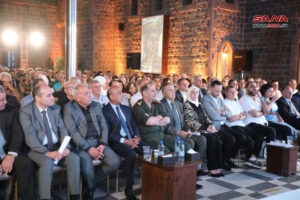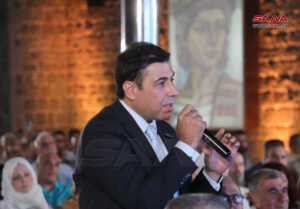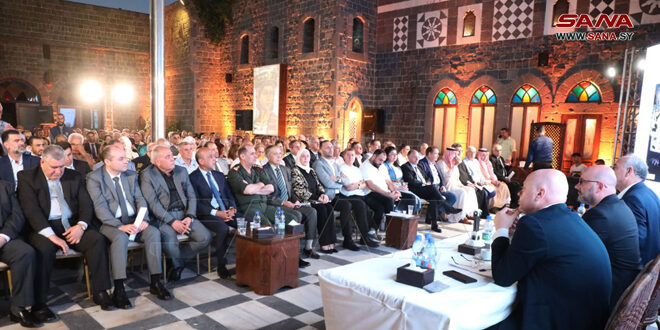Homs, (ST) – The Homs Chambers of Commerce and Industry and the Syrian Trust for Development have completed the largest part of the technical studies for the project to restore the heritage markets of Homs as part of the work to revive the economic, cultural and social role of these markets, with the participation of the people of Homs and its expatriates and representatives of official and civil authorities.
 The Head of the Homs Chamber of Commerce, Iyad Al-Sabai clarified during a ceremony held today in the old city of Homs that since the signing of a cooperation agreement between the Homs Chambers of Commerce and Industry and the Syria Trust for Development to revive the heritage markets in the city of Homs on April 24, everyone has been working hard despite the difficulties and challenges to launch the project to revive the heritage markets.
The Head of the Homs Chamber of Commerce, Iyad Al-Sabai clarified during a ceremony held today in the old city of Homs that since the signing of a cooperation agreement between the Homs Chambers of Commerce and Industry and the Syria Trust for Development to revive the heritage markets in the city of Homs on April 24, everyone has been working hard despite the difficulties and challenges to launch the project to revive the heritage markets.
These efforts were crowned with success and the wheel of work has been turning for several days, noting the expected results of the project, provided that Homs is a historical and ancient city and its heritage markets are the memory of all citizens in the province, whether residents or expatriates.
Al-Sabai called for everyone to join efforts and contribute to supporting this project, each according to his/her capacity and ability, thanking everyone who contributed to supporting this project.
In turn, the Head of the Homs Chamber of Industry Labib Al-Ikhwan pointed out that the project is a purely community project and that after launching work in the old Homs markets, it will be followed by the Naoura markets, which are part of a single project, followed by projects on other axes such as the Hama Road east and west, and the Jouret Al-Shiyah neighborhood, extending to Abdul Hamid Al-Daroubi Street and Al-Dablan Street.
In turn, the CEO of the Syrian Trust for Development Shadi Al-Alshi stated in his speech that the project was launched a few days ago by the people of the province and a dedicated work team.
He added that the Syrian Trust for Development will contribute to carrying out projects aiming at preserving the heritage markets of Homs, pointing out that the largest part of the technical studies have been completed, which include the maintenance of the facades, arches, sidewalks, sewage, and the provision of services, electricity, cleaning, and everything necessary for the markets, indicating that the goal is to provide a service environment for the people and attract people from inside and outside the province to restore the economic wheel and support the workers and owners in these shops.
In turn, Director of the Project to Restore the Historic Markets in Homs, Abed Atassi indicated that the necessary study has been prepared and coordination with the relevant authorities has been initiated and approved.

In an interview with SANA reporter, Sameh Hasriyya, a merchant of the Silk Market in Homs, indicated that several meetings of the Homs Chamber of Commerce demanded the restoration of the markets, noting that spotlights were placed in the Silk Market that highlighted the features and beauty of this heritage market, and stressing that there is a great restoration movement within this market to restore the economic wheel.
He said that Decree No. 13 of 2022 contributed to the return of a large number of merchants to their shops.
In turn, Muhammad Munib Al-Zain, a merchant of the market opposite the door of the Grand Mosque, indicated that the market needs a roof to protect it during rainy times and it needs restoration of the walls, indicating that this market carries their memories and they work in it from father to grandfather.
The launching ceremony of the project included a short video about the details experienced by the merchants and industrialists in Homs heritage markets, another video about the state of Homs’ heritage markets presented by the shop owners, merchants and industrialists, and another video about the start of the first phase of the restoration of Homs’ heritage markets, in addition to an open dialogue between the attendees and a number of expatriates via the Internet, where a number of expatriates expressed their desire to invest in these markets, cooperate, help, and transfer the acquired expertise and skills to build the country’s economy.
Raghda Sawas

